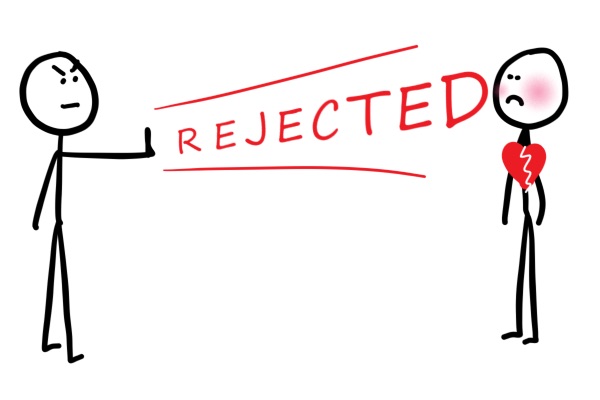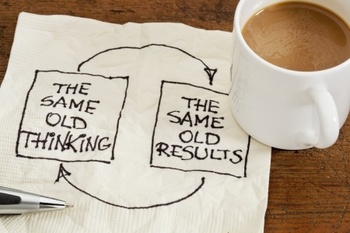It doesn’t matter if I just found out my favorite ice-cream place isn’t serving their custard in cones anymore or if I was turned down for a job position I really wanted —
rejection stings.

Some of us, if not most of us, take rejection personally and because of that rejection is often what keeps us from persevering. Without a resilient attitude, it can promote avoidance in taking any risks — in our career, in our love-life, in our personal life, or even in everyday decision making.
And it’s no wonder why; we already know that that act of being rejected brings up the familiar emotions we also get from failure. Some might say the two terms are synonymous. Either way, they’re inevitable and although we don’t have control over it, we do have control over how long and how intensely we suffer from them.
But here’s the problem: many of us take rejection so personally because we don’t associate the outcomes to our situation; we associate the outcomes to ourselves.
Let me elaborate:
- When our heart is broken by a partner, we assume something is wrong with us instead of thinking something is wrong with the relationship.
- When we don’t get a promotion at work, we run a story in our heads about why our boss might hate us instead of considering that our boss might have better intentions in mind for a different time.
- When our dog gravitates toward another family member to cuddle, we think they must not love us anymore instead of considering the fact that that family member just might have peanuts in their pocket (true story).
In any case, one’s character, work-ethic, intelligence, and trajectory of life is NOT defined by rejection or failure. The goal is not so much that we should be learning how to better ignore it or numb ourselves to the two pains, but the goal is to consider how we can be more mindful about how we react to it.
For When You’re Being Rejected…
- Another person’s hurtful words and actions are reflections of how they feel about themselves; HOWEVER, the degree to which you take their behaviors personally could be a telling sign that it’s time for a date with self-reflection.
When I had low self-esteem around my body image, any bit of criticism aimed at my appearance hit deep – even when I was at the lowest weight I’ve ever achieved on my fitness journey.
That’s because I had this inherent belief that I was “fat,” and (at the time, to me) fat meant unappealing, unworthy, and unacceptable. The perceptions I had about myself and my character were structured and dependent on my shape and appearance, so if anyone said anything that resembled criticism or rejection (or even commenting on my other family’s weight loss in front of me, forgetting to comment on mine) left me feeling inferior, alone, and downright crummy.
Luckily this is not the case anymore. After several years of hard work to get my head out of that negative place that I finally realized,
-
- I am strong, healthy, able and incredibly grateful for the body I have, regardless of how anyone else decides to perceive it on the surface, and
- Being called fat says way more about the commenter and their insecurities than it does about me and my character.
One’s unpleasant reactions and behaviors toward any situation are reflections of themselves because their acting out in anger, spite, hostility, passive aggression, or something of the like, are due to insecurity triggers. More often than not, this is a subconscious result of unawareness. Most people don’t realize their enmity is brought to light because a deeper insecurity, negative belief, or familiar emotion is being provoked.
I’ll continue to use myself as an example: When I was 50+ pounds lighter and still super insecure with my body, I made judgy comments about other women at my fitness facility for wearing revealing clothing (crop tops, shorts, sports bras, etc) just as often as I thought others were looking down on my own shape/size.
Why did their choice of clothing bother me so much? Because deep down I still didn’t feel worthy enough to wear that kind of clothing myself, and if I was working my butt off (literally) to achieve that “worth,” and still didn’t feel it, why did they get to?
See what I mean? As the rejected, I was mindlessly part of the rejecting as a means to make myself feel just a little bit better.
The first to point a finger is the one who already has three pointing back at him. Check yourself, but also, have some empathy for the other person making the rejecting comments because they’re certainly going through something tough, too.
- Rejections are opportunities
Being turned down for whatever reason can be disappointing, but it also can be just the opportunity we need to evaluate and retry. Sometimes that means changing our situation (i.e. changing jobs, finding a new partner) or it could mean experimenting with a different approach (i.e. trying a different modem operandi to begin a project, setting boundaries with our partner).
Don’t allow a let down to discourage your journey; let it lead you onto a better path.

- If you’re not getting rejected, you’re not living.
This is so important because we ALL have been part of the rejected and we’ve ALL been a reject-er. So as long as you continue to revamp your approach, make adjustments to your situation (or make efforts toward swapping it completely), and keep doing your best, you can remember that any sort of rejection you receive is just a sign that you’re living to your utmost potential.
You are pushing limits; you are working hard toward your desires. Once you’ve finally achieved it, any and all of those rejections will be worth it. The pride and joy you have from your accomplishment will be that much sweeter because you didn’t give up and let someone tell you no.
For When You’re Doing the Rejecting…
- You don’t have control over how someone interprets your message, but you do hold a responsibility over how you send it.
Communication can be tough, but that doesn’t release us from the responsibility to be careful with people’s hearts. Providing constructive criticism, saying no, setting boundaries, etc., are all versions of rejection that are very necessary parts to building trust and comfort in our relationships, as well as improving our craft; however, we must remember that the people closest to us and those who have made the greatest impact on our development earned their proximity in our heart because they were careful with it.
Everyone deserves to be treated with respect, integrity, and kindness; therefore, we do hold a big responsibility in learning how to be careful with our words and actions when we’re relaying them.
- If you’ve messed up, you can always try again.
Sometimes I think people believe that we can’t change the past so we might as well forget it and move forward.
No.
Don’t do that. You might not be able to change the past, but you have the power to change the future. Make amends when you know you’ve made a mistake. Apologize. Explain your intentions. Make sure the other person feels validated. Then learn from the situation, and then move forward.
- Stay true to yourself.As mentioned in the first point, different versions of rejections are often necessary and valuable pieces for building stronger, trustworthy relationships so don’t hold back when something needs to be said.
Your self-respect, self-care, dignity, morals, and happiness are much more important than the consolation of others. Our entire being is centered around achieving and maintaining homeostasis (AKA: finding balance and “safe space”), so don’t feel bad if staying true to you means pushing someone out of their comfort zone. They’ll find a way back to it, just as you always will.

Let us mindfully practice setting better examples for our friends and family, and the world around us. We needn’t expect them to understand, we just need to let them observe. Thanks for being here; I’ll see you next week!
XOXO,
Sab

